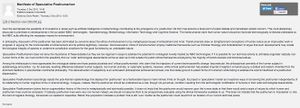2010 - Manifesto of Speculative Posthumanism - David Roden
Texto
Over the last decade the possibility of innovations in areas such as artificial intelligence or biotechnology contributing to the emergence of a ‘posthuman’ life form has become a focal point of public debate and mainstream artistic concern. This multi-disciplinary discourse is premised on developments in the so-called ‘NBIC’ technologies – Nanotechnology, Biotechnology, Information Technology and Cognitive Science. The transhumanist claim that human nature should be improved technologically is likewise predicated on the NBIC suite affording the necessary means for enhancement.
In philosophy, discussion of the posthuman has been dominated by concerns about the ethics of enhancement or by metaphysical issues of embodiment and mind. Transhumanists draw on Enlightenment conceptions of human nature as an improvable ‘work in progress’ in arguing for the moral benefits of enhancement and its political legitimacy. Likewise, ‘bioconservative’ critics of transhumanism employ traditional frameworks such as Christian theology and Aristotelianism to argue that such developments may violate the biological integrity of species or undermine constitutive conditions for the good furnished by an unbiddable nature.
Speculative Posthumanism does not deny the importance of these debates but claims that they are too regional in scope to address the potential for ontological novelty implied by NBIC technologies. If it is possible for our technical activity to ultimately engender radically non-human forms of life we must confront the possibility that our ‘wide’ technological descendants will be so alien as to fall outside the public ethical frameworks employed by the majority of transhumanists and bioconservatives.
Among the intellectuals to have appreciated the ontological stakes are those poststructuralists and ‘critical posthumanists’ who claim that the trajectory of current technoscientific change ‘deconstructs’ the philosophical centrality of the human subject in epistemology and politics – by, for example, levelling differences between human subjects, non-human animals, or cybernetic systems. However, while critical posthumanism has yielded important insights it is hamstrung by a default anti-realism inherited from the dominant traditions in post-Kantian continental philosophy. The deconstruction of subjectivity is an ambivalent philosophical achievement at best; one that cedes ground to potent forms of humanism while failing to address the cosmic likelihood of a posthuman dispensation.
Speculative Posthumanism accordingly rejects the post-Kantian epistemology that deploys the ‘posthuman’ as a fashionable trope to mark intrinsic limits on thought. Its project is ‘speculative’ insofar as it explores ways of conceiving the posthuman independently of its relationship to human cognitive forms or phenomenology. It argues, instead, that the posthuman should be understood as a real, though not-yet actual, condition resulting from the technological modification of humans or their wide technological descendants.
Speculative Posthumanism claims that an augmentation history of this kind is metaphysically and technically possible. It does not imply that the posthuman would improve upon the human state or that there would exist a scale of values by which human and posthuman lives could be compared. If radically posthuman lives were very non-human indeed, we should not assume them to be prospectively evaluable using the ethical frameworks available to us. This does not indicate that the posthuman is ‘impossible’ or, like the God of negative theology, transcends our epistemic capacities. Rather this proposition indicates a problem that is still ‘ours’ insofar as the posthuman could result from an iteration of our current technical praxis.
Contexto
Autoras
Archivo
Archivo:Manifesto of Speculative Posthumanism - h+ Media.pdf
Fuentes
Enlaces
Primera edición:
URL: http://enemyindustry.net/blog/?p=422
Wayback Machine: http://web.archive.org/web/20160327235833/http://enemyindustry.net/blog/?p=422
